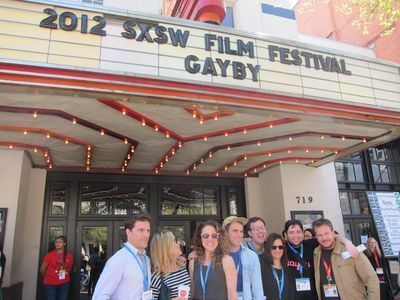Alex Ross's Blog, page 199
March 21, 2012
Minimalist Republicans
I hesitate to clutter my site with obnoxious political propaganda, but this House Budget Committee ad is of slight musical interest. David Brendel — who had the idea for my Rest Is Noise show with Ethan Iverson — points out that Rep. Ryan's alleged plan to minimize the deficit is laden with a, yes, minimalist soundtrack: Reichian pulsing (or Tangerine Dream) in the first part, Glassy chords in the second. I doubt that either composer would be pleased by the homage, but at least the Republicans are staying away from the Copland-homophobia combination this time. Feel free to employ the "like / dislike" feature.
Mavericky Miscellany
Douglas McLennan, the proprietor of ArtsJournal, has set up an Arts Blogger Challenge, in conjunction with the next edition of Spring for Music, in May. The initiative has stirred up some opposition, notable from Lisa Hirsch; Doug defends himself from the accusation that he is failing to take seriously a discipline that he helped to invent. The deadline for entering is today. (No, I will not be participating.)... Blue Heron, the superb Boston-based Renaissance vocal ensemble, sings at the Cloisters on Sunday. I wrote about the group last year.... The American Mavericks blitz begins this weekend, with William Basinski and Tristan Perich at the Kitchen, Mary Halvorson and music of the late Arthur Russell at same, Lisa Moore in Queens, and the JACK Quartet. Meanwhile, the Brooklyn Phil is presenting their Brooklyn Village project on Saturday and Sunday.... I caught City Opera's Così fan tutte last night. Christopher Alden's staging starts well, with Sunday-in-the-park, Belle Époque imagery edging into surrealism, but action in the second act slows literally to a crawl. The young British tenor Allan Clayton is the standout in the cast. All told, it's an improvement on the anonymous Traviata last month.... Sarah Baird Knight asks music critics, "How do you approach music that draws from multiple traditions, or that falls between genre lines?" An excellent question, worth pondering. Almost all critics will be rooted most strongly in one genre or another, and will feel at least a touch unsure when confronted with a hybrid. I've written about my own insecurities outside the classical zone here. As far as I can judge, there is only one critic actively working who writes about pop and classical music with equal — and great — authority. That is Steve Smith. The New York Times ought to feel lucky to have him.
March 20, 2012
The real Mitt Romney
A Presidential election year is again upon us, bringing with it more politically inflected speech-music videos. The champion offering of 2008 was Henry Hey's jazz-piano meditation on Sarah Palin. A strong contender for 2012 is Hugh Atkin's Mitt Romney video above, adapted from Eminem. Choice YouTube comment: "Mitt Romney liked and disliked this video."
March 19, 2012
Forever Pete
Forever Pete! is an Internet campaign to put Pete Seeger, the ninety-two-year-old master of American folk and the stepson of a formidable twentieth-century composer, back on the Billboard singles chart. He has recorded Bob Dylan's "Forever Young" for a four-CD Dylan compilation benefitting Amnesty International. The LA Times has a story about this commendable project.
March 16, 2012
The song remains the same
Peter Sellars to People magazine — yes, People — in 1985: "We've got to be willing to take some risks. So much of Broadway is aimed for the taste of some mythological white-haired lady from Westchester [County]. We're after a new audience—the kind that would just as soon spend their money on cassette tapes."
Premiere
More or less all I've done in Austin this week has been to serve as chauffeur for the brilliant and gorgeous cast of Gayby, but I'll try to muster comment on a smattering of music events in the next day or two. This weekend there's a contemporary classical showcase at SXSW.
March 15, 2012
EMP 2012
The irrepressibly zany Stephen Colbert has taken an interest in Experience Music Project's Pop Conference, the crucial annual convocation of pop musicology and commentary. Colbert is claiming that his own proposal for a paper, "Self-Love in an Elevator: Apollonian Images of Hedonism, Eroticism, and the Mechanized Urban Lanscape of Post-Comeback Aerosmith," has been ignored in favor of less progressive disquisitions. Be that as it may, the Pop Conference has an exceptionally rich range of offerings this year, including keynote addresses by Esperanza Spalding and Questlove. The festivities will unfold at NYU's Kimmel Center; registration is free.
Previously: Colbert does opera, Top ten AMS paper titles.
March 12, 2012
Checking into the Hotel Elefant

A New York contemporary-music ensemble has sprung up with the intriguing name Hotel Elefant; it will make its debut on March 15, at the DiMenna Center for Classical Music, with a concert featuring works of David T. Little, Chinary Ung, Peter Bussigel, Leaha Maria Villarreal, and Mary Kouyoumdjian. I took notice when the name showed up in a press release, because it reminded me of a singular scene that I describe in the opening pages of The Rest Is Noise: a meeting of Strauss, Mahler, Puccini, and Schoenberg at the Hotel Elefant in Graz, following the Austrian premiere of Strauss's Salome at the Graz Opera, on May 16, 1906. The composers talked well into the night, although, alas, only a few scraps of their conversation were recorded. The following day, Strauss wrote to his wife mainly about himself: "It is raining, and I am sitting on the garden terrace of my hotel, in order to report to you that Salome went well, gigantic success, people applauding for ten minutes until the fire curtain came down, etc., etc."
 As it happens, when I was working on The Rest Is Noise, I spent an inordinate amount of time trying to track down information about the Hotel Elefant — the kind of obsessive pursuit of the tangential yet somehow essential detail that often overtakes authors of books. The debut of the Hotel Elefant ensemble is perhaps the only occasion I will ever have to disgorge this small store of trivia. There are various old hotels and inns called Elefant in Germany and Austria; the name was apparently inspired by an Indian elephant that Emperor Maximilian had brought to Vienna in 1552, its appearance causing great excitement along the way. Graz's Elefant had existed for centuries, and took on the status of a grand hotel when Eduard List opened a large new structure in 1889. (List's grandson Hans was a world authority on internal-combustion engines, as I learned from his memoirs.) After the Anschluss, the hotel was taken over by the Wehrmacht. An Elefant waiter named Adolf Stengl, horrified by Kristallnacht, attempted to warn foreign observers of the scale of the pogrom against Jews; for this action he was arrested, and was not heard from again. The hotel closed in 1945. It has made one notable appearance in fiction: in Thomas Pynchon's novel Against the Day, two characters meet in the hotel's garden, against the backdrop of the Bosnian Crisis of 1908-09.
As it happens, when I was working on The Rest Is Noise, I spent an inordinate amount of time trying to track down information about the Hotel Elefant — the kind of obsessive pursuit of the tangential yet somehow essential detail that often overtakes authors of books. The debut of the Hotel Elefant ensemble is perhaps the only occasion I will ever have to disgorge this small store of trivia. There are various old hotels and inns called Elefant in Germany and Austria; the name was apparently inspired by an Indian elephant that Emperor Maximilian had brought to Vienna in 1552, its appearance causing great excitement along the way. Graz's Elefant had existed for centuries, and took on the status of a grand hotel when Eduard List opened a large new structure in 1889. (List's grandson Hans was a world authority on internal-combustion engines, as I learned from his memoirs.) After the Anschluss, the hotel was taken over by the Wehrmacht. An Elefant waiter named Adolf Stengl, horrified by Kristallnacht, attempted to warn foreign observers of the scale of the pogrom against Jews; for this action he was arrested, and was not heard from again. The hotel closed in 1945. It has made one notable appearance in fiction: in Thomas Pynchon's novel Against the Day, two characters meet in the hotel's garden, against the backdrop of the Bosnian Crisis of 1908-09.
In 2001, as I was beginning to write my book, I stopped for a night in Graz. Turandot was playing at the opera house, in a bizarre production set in a futuristic pop-culture world of ultraviolent football games and striptease cheerleaders. The next morning, I went looking for the Elefant, clinging to the idea that I might be able to find an old hotel ledger in which all those famous names could still be read. But the Elefant was now the site of the local offices of the Austrian Trade Union Federation, and the ledger had disappeared. "Ja, there was a hotel here," an elderly desk clerk told me. "Eighteenth century. Nineteenth century. Long time ago." Standing in the parking lot where the garden used to be, I struggled to picture that rainy morning in 1906, when Richard Strauss said good-bye to Gustav Mahler, and sat contentedly on the terrace for a while.
March 11, 2012
Montsalvatge 100
Today is the hundredth anniversary of the birth of the subtly potent Catalan composer Xavier Montsalvatge. A website dedicated to him takes note of various activities in Barcelona. The harpsichordist, scholar, and blogger Roger Evans has completed a biography of Montsalvatge, to be published soon by Pendragon Press; Hänssler Classic has issued a bewitching CD entitled Canciones & Conciertos, with Poema concertante, Cinco canciones negras, and Concierto breve. There will be a concert in New York on March 20 at Steinwall Hall.
Proper parenting
From Mike Rubin's New York Times profile of the electronic musician Nicolas Jaar: "The elder Mr. Jaar and his wife also fed their son a steady diet of Keith Jarrett and John Cage, who is a likely influence on [Jaar's] sound-collage experiments. 'My husband and I, we were always interested in the avant-garde,' said Evelyne Meynard, Mr. Jaar's mother, a former dancer who trained with Merce Cunningham's company in the early '80s. 'I always encouraged Nicky to understand that not only melody and harmony were interesting, but that atonal music and sounds and all that were also interesting.'"
Alex Ross's Blog
- Alex Ross's profile
- 425 followers





